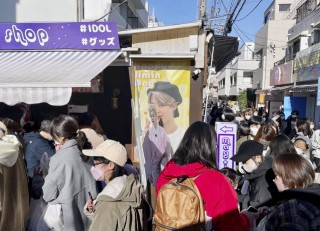Loading
Search
▼ As The Pandemic Drags On, More In Japan Find Solace In 'Oshikatsu' Devotion
- Category:Event
“Oshikatsu,” a Japanese word meaning the act of enthusiastically supporting someone like an idol singer or actor that one feels particular devotion to, is increasingly taking hold in Japan.
Such activities — long monopolized by otaku, or people with an obsessive interest in Japanese pop culture such as anime and manga — have now become a part of everyday life for many people, with such fans increasingly interacting via Instagram and Twitter.
With the COVID-19 pandemic having gone on for more than two years, they are putting even more energy into oshikatsu, which gives them opportunities to think positively again and broaden their mind.
“I can’t go back to life without it,” says Yukiko Fukuda, a 49-year-old resident of Hiroshima’s Saeki Ward whose “oshi” — a person or a thing you support — is South Korean boy band BTS.
After being thrilled by their performance on TV a little more than a year ago, she found herself browsing more and more related websites and then started buying BTS merchandise. She even held a birthday party for one of the members, alone at home with a specially prepared macaron. “There are countless ways to enjoy yourself,” she says with a smile.
Oshikatsu is also expanding among fans of athletes and YouTubers.
Hiroko Sebu, who works as a composer, became a fan of baseball player Ryuji Yokoyama about 10 years ago when he captured her attention while pitching as a member of the Hiroshima Carp, at Mazda Stadium in Hiroshima’s Minami Ward.
Since then, she became an enthusiastic Carp fan and the COVID-19 pandemic prompted her to move from Tokyo to Hiroshima in July to live near the stadium, the team’s home ground.
Yumi Watanuki, 27, of Minami Ward, supports an actor performing in so-called 2.5-dimensional stage productions (2.5D) that draw on manga, anime and computer-game content.
Watanuki became a fan of the actor when she had been having difficulty deciding what to do after graduating from college, and this led her to choose to work for an entertainment agency.
Writer Yoshiaki Yokogawa, 38, published a book with a title that translates roughly to “I, an otaku of handsome actors, seriously thought about what oshi means to mankind.” He explains that oshi is a shortened form of oshimen — in turn an abbreviation of “oshitai menbā,” meaning “a (group) member you want to support.”
The word began to be recognized widely in around 2010 along with the rising popularity of idol girl group AKB48, according to Yokogawa.
Novelist Rin Usami last year won the prestigious Akutagawa Prize literary award for her novel “Oshi, Moyu,” which translates as “Oshi on fire.” The novel attracted attention as it depicts a high school girl’s life falling apart after a male idol she follows becomes involved in a scandal.
While otaku who are obsessed with anime and idols tended to attract a negative impression in the past, Yokogawa says people began to have a positive image of them amid increased diversity of thought.
Moreover, with vast amounts of information available on the internet, it has become easier for people to find content about the subjects of interest. Online communities of devotees expanded, further boosting the phenomenon.
People who are too obsessed with oshikatsu are described as “falling into a swamp.” And the swamp can sometimes turn out to be bottomless.
Sachiko Takeuchi, a 39-year-old manga artist, fell into a swamp following the 2011 Great East Japan Earthquake. She would often be gone from home for a week at a time to watch performances by 2.5D actors, and would spend any amount of money to buy presents for them.
The oshikatsu-centered lifestyle damaged her health and seriously affected her household finances.
In a manga essay with a title that translates to “I’m turning 40 in a swamp,” she writes about how her fear over the 2011 disaster triggered the situation.
Environments in which people are forced to work remotely or refrain from going out can also make them prone to becoming overly obsessed.
The internet is overflowing with content related to oshi, and people can access them limitlessly while at home; this is the joy of oshikatsu.
But, Takeuchi said, “It is dangerous to try to ease your fear and stress by devoting yourself to oshikatsu.”
There are no clear rules to oshikatsu. “You have to discipline yourself, such as setting a time limit” in order to avoid becoming addicted, Takeuchi said.
Jane Su, a 48-year-old novelist and columnist, described her own oshikatsu rules in her book “Hitomazu Jodeki,” which roughly translates to “Well done for now,” creating a buzz online and striking a chord with many people involved in oshikatsu.
Her rules are to never disclose who she supports, and never mention her oshi on radio nor in magazines.
The degree of enthusiasm for oshi differs by people, so any remark or act could lead to conflicts even with others who support the same individual.
Su says if fans respect each other and think about how the person they support is also special to someone else, they can engage in the kind of activities that fit them without being overly influenced by others.
Su’s essay, filled with love for oshikatsu, says, “Everyone lives with something heavy on their heart to a greater or lesser extent. Only you yourself can lift up your heart, but I don’t get motivated to do so without the help of oshi or entertainment.”
You can be energized if you cheer for someone you are a great fan of, to your heart’s content, in a place outside home or work. The oshikatsu fever is likely to continue for some time to help people live positively and survive tough times.
- April 5, 2022
- Comment (0)
- Trackback(0)


